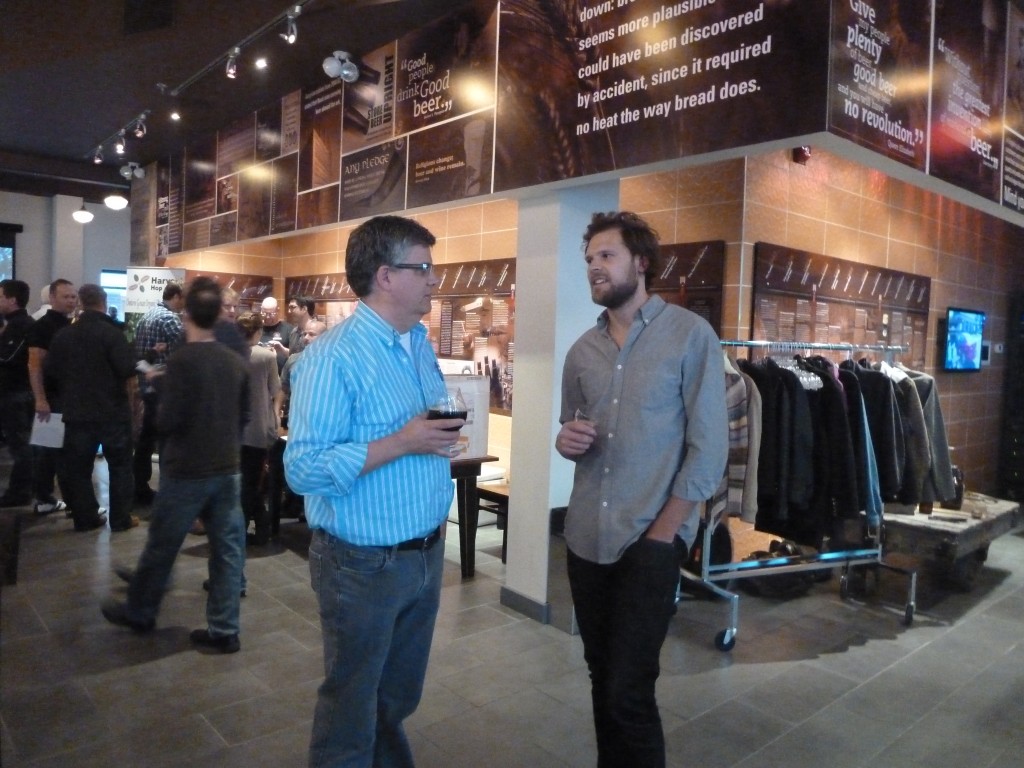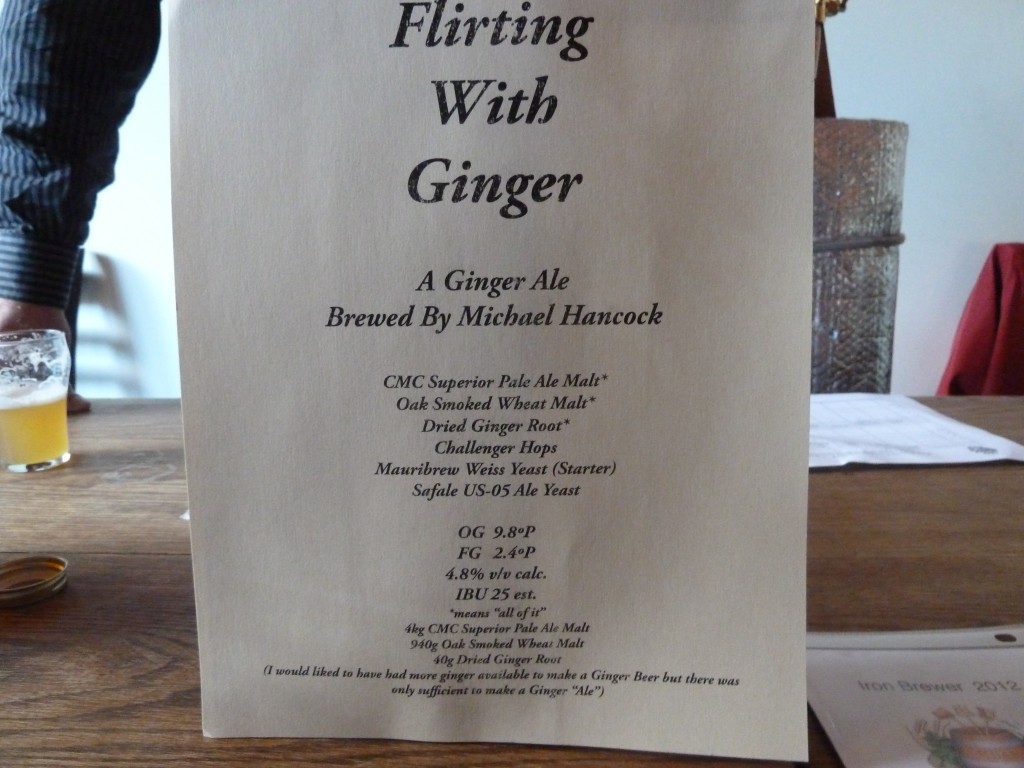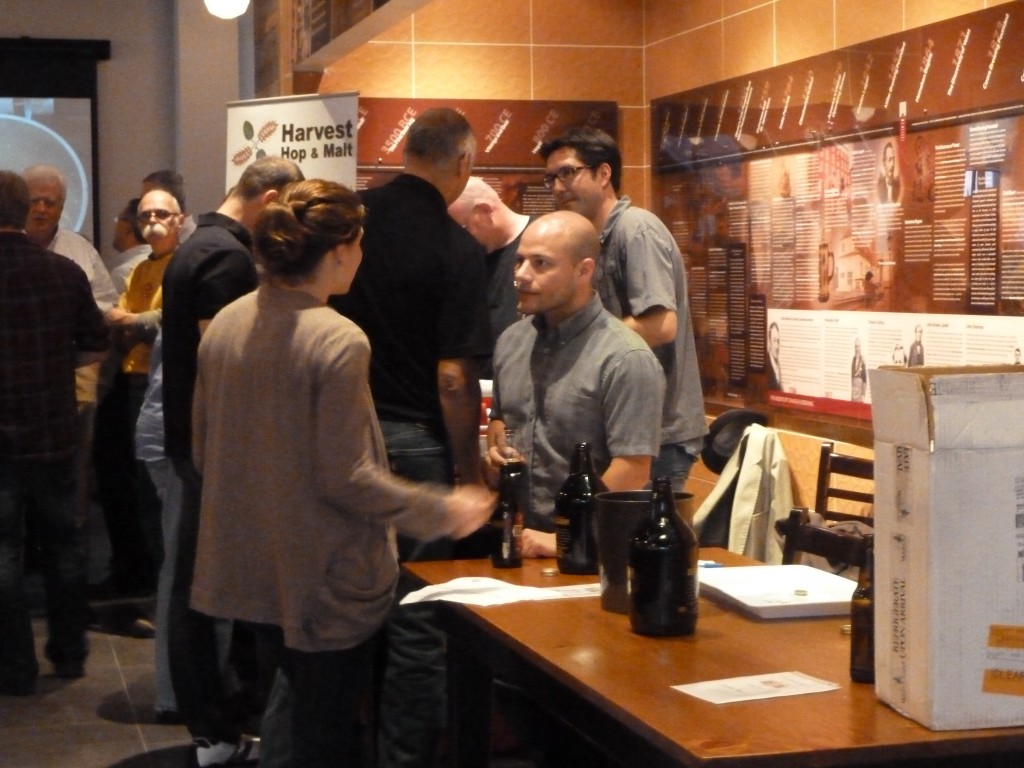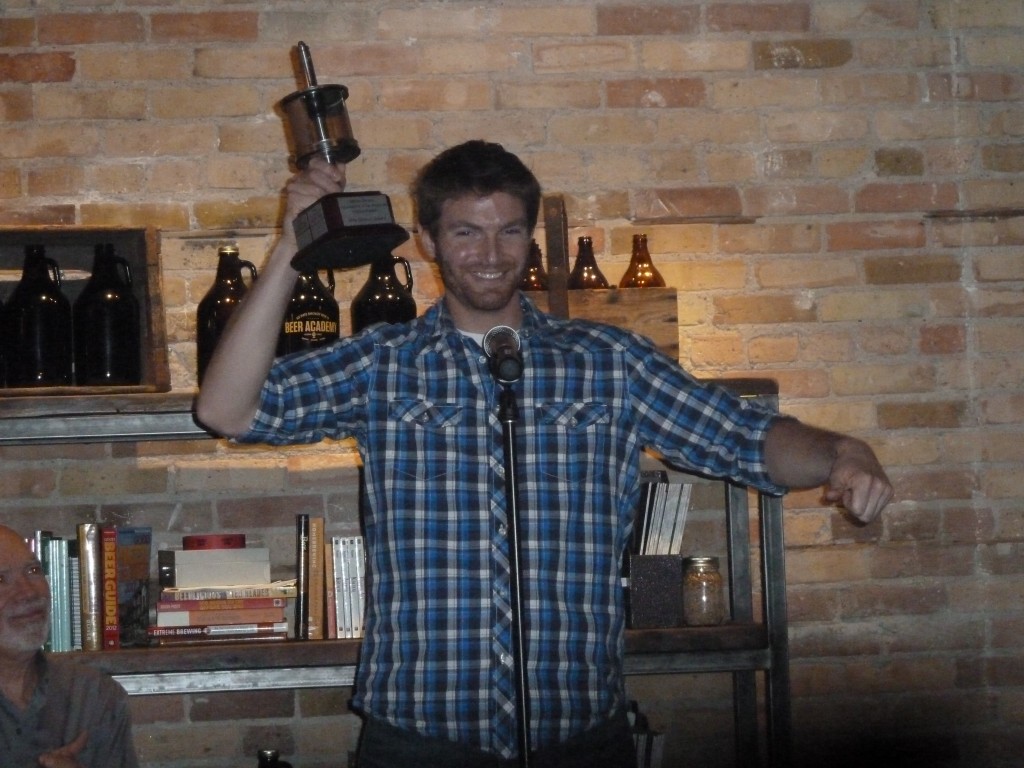What would you do with these ingredients?
Base malts:
Muntons Marris Otter
Dark Bohemian Pilsner Floor Malt
CMC Superior Pale
Specialty Malt
Oak Smoked Wheat Malt
Dark Bohemian Wheat Floor Malt
OiO Barley Flakes
OIO Wheat Flakes Toasted (Torrified) OIO
Brewers Oat Flakes (Quick)
OiO Rye Flakes Toasted
Thomas Fawcett Chocolate Malt
Best Malz Chit Malt
Franco Belges Caramel 120 Malt
Specialty items:
Raspberry Puree
Lemon Peel
Ginger Root
Whirlfloc Tablet
Hops:
– Amarillo
– Challenger
– Legacy
– Magnum
– Willamette
– A certificate for whole Bertwell hops
Yeast:
Safale US-05
Saflager S-23
Mauribrew Weiss
Safbrew T-58
Possibly a new cask yeast
If you’re anything like me, you’d have to look up exactly what chit malt is and what legacy hops taste like. If you’re a professional brewer, you’d probably still have to look up some of them. After about fifteen minutes of staring in positive befuddlement at the list, you’d probably have a pretty good idea of what you could do with some of the ingredients; of the kinds of flavours that you might be able to coax out of them. You might shout “Eureka!” or if you don’t want to picture a damp, naked, Archimedes combing the streets of Syracuse for a writing implement, you might get that faraway look Hugh Laurie gets when he realizes exactly which disease the patient has.
The Master Brewer’s Association hosts an annual event that facilitates this kind of improvisational whimsy: THE IRON BREWER. It is a popular event these days; so popular in fact that this year’s 15 competitors were chosen from a lottery of nearly twice that many applicants.
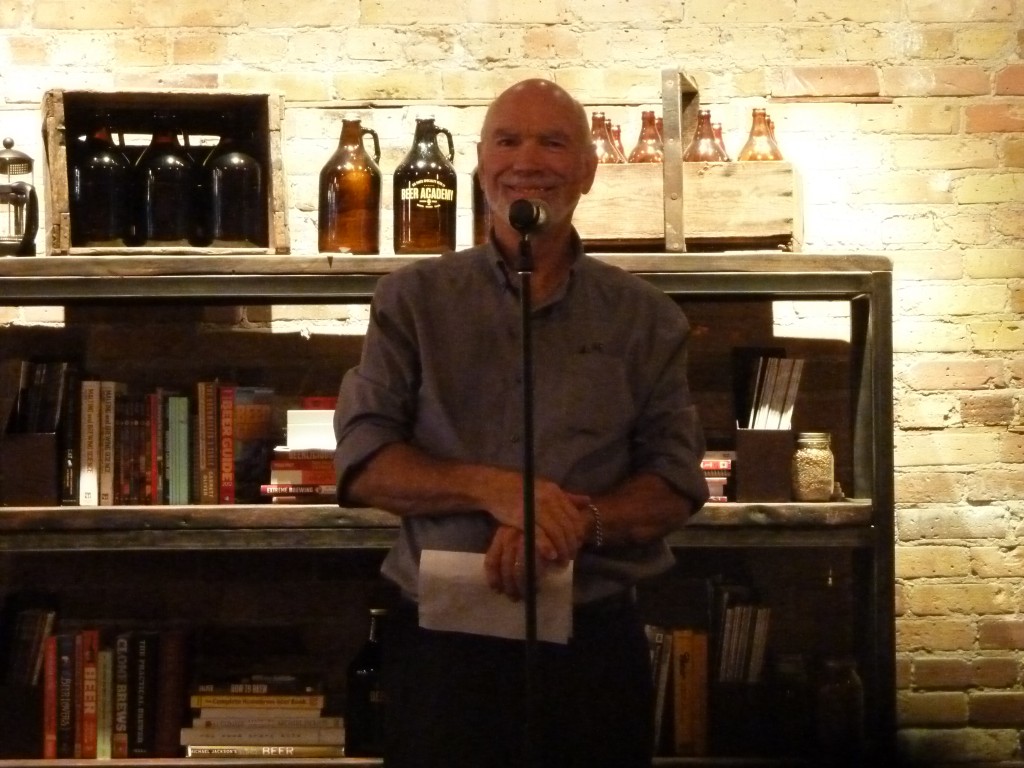
Master Brewer and all around nice guy Paul Dickey served as Emcee for the proceedings. Here he is pictured humouring a photographer.
Brewers like the ability to improvise, especially when they get the opportunity to do it for a small audience of likeminded individuals. One of the significant components of the event is that no two brewers will look at the list of ingredients and come up with exactly the same beer. Everybody has different tastes and skill sets. Fortunately for the audience, all of the competitors are highly trained.
I’m moderately trained. Looking at those ingredients, I might have come up with something like this RASPBERRY PORTER type of thing. I would assume that you get some body from the oats and rye and the caramel would bring a touch of nuttiness, although at 120 Lovibond, probably more color than anything. The Chocolate malt is almost exclusively there for color and to provide a small backbone for the raspberry to play off. I went with Legacy hops because the raspberry might work well with the blackcurrant notes and I went with Willamette to give it an English feel (fuggle variant). I chose US-05 because I’m scared of the T-58. It’s mostly for bottle conditioning.
Alternately, I’d be tempted to try this GINGER LEMON WHEAT BEER. I don’t know whether that has enough diastatic power to get off the ground, but it’s worth a shot. The chit malt will give it a touch of green barley character and the oak smoked wheat malt… well, you’ve got to use it, haven’t you? It’s the big shiny red button. Challenger is a relatively neutral Northern Brewer style bittering hop, so I feel the Amarillo will really come through on the nose with the ginger root and lemon peel.
I should tell you that no one really did the same things that I would have. They did much more interesting things.
Michael Hancock, for instance, did a Ginger Ale called Flirting With Ginger. If I understand the explanation correctly, he created a starter for the beer that incorporated the ginger root in order to drag as much flavour as possible out of it. Like me, he was tempted by the Smoked Wheat Malt and used every bit that was provided to him. The result was a one off smoky ginger beer where the ginger came through right in the middle of the palate. As he notes, it’s not really enough ginger to be an authentic Ginger Beer. Pretty tasty, though.
My Co-Author Mark Murphy decided to brew an Oatmeal Brown Ale. It was pretty thoroughly drinkable if a little buttery. I think with a little revision, I could see that one on tap. He left some of the ingredients in the box, but you have to brew what you feel. You should buy his book. Heck, you should buy my book. It’s the same book, so I’ve just saved you at least a single mouse click. (I’m starting to feel like Jay Sherman.)
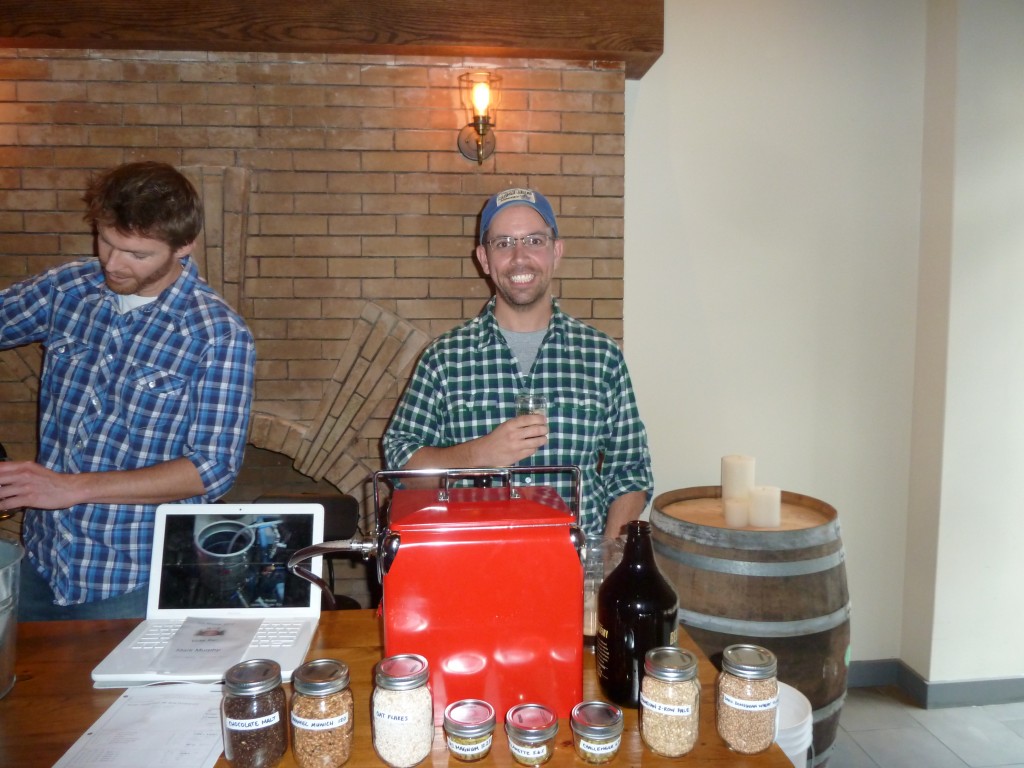
Mark Murphy is a very organized man. You might think he labelled those jars just for the competition. You would be wrong.
Dan Unkerskov and Scott Pautler from Lake of Bays worked together to create something closer to the ginger/lemon beer that I would have gone for. Wisely, they eschewed the smoked wheat malt. Somewhat oddly, they put the lemon peel and ginger root in right at the beginning of the boil. I’ve always figured that aromatics go in towards the end, so I was surprised to see the ginger and lemon come through to the extent they did. Possibly you could do both. It was nice to see the specialty ingredients used in a straightforward way with a clarity of vision. This is probably why they took third place. Either that or people were voting for Dan’s moustache.
I feel like I should point out that all of the ingredients were optional. Jon Downing from Niagara College didn’t feel that way about it. He made three beers and used all of the ingredients. In order to get around the fact that you were only really meant to brew one beer he made all three with a continuous mash, essentially using the second runnings of the first mash to brew the second beer and so on. A brewing centipede, if you will. It’s a pretty neat concept, and quite virtuosic if a bit muddled. I think the best part about this was the first beer, which was sort of like what a Berliner Weisse might be like without the Lactobacillus. Educational and interesting, which is, let’s face it, his job.
In the end, everyone represented themselves very well. Special mentions go to Jeffrey Woodworth (drinkable yet challenging), Jamie Mistry (flat out drinkable) and Chris Williams (who would have gotten away with it if he had had a Saison yeast.)
Your winner is Andy D. Preston Esq. He will be appearing with Ted “Theodore” Logan at some point in the future.
